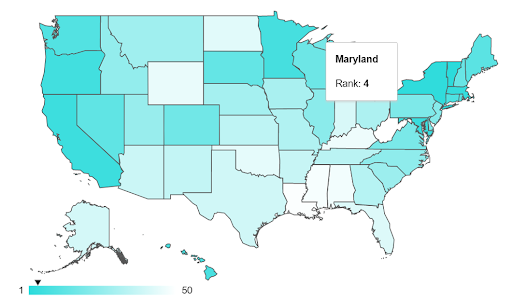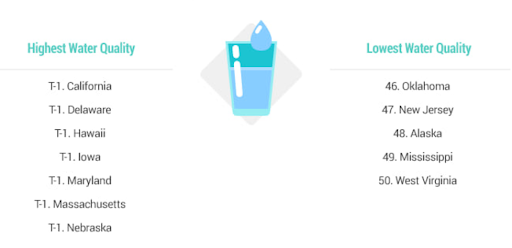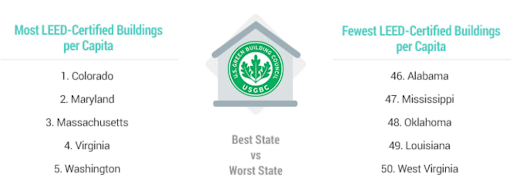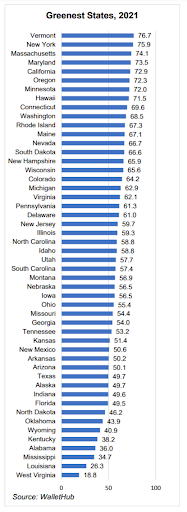WalletHub Ranks Maryland 4th in Eco-Friendly States

WalletHub recently released a report that scores and ranks states based on their environmental friendliness. Overall, Maryland scored 73.51% ranking 7th in Environmental Quality 5th in Eco-Friendly Behaviors and 8th in Climate Change Contributions. The report associates poor environmental stewardship with increased costs for natural disasters, citing a record 22 natural disasters exceeding $1 billion in damage in 2020 in the United States. The study scored states in three categories, evaluating a total of 25 metrics. Each metric was scored on a 100-point scale and assigned a weight, with a score of 100 indicating the most environmental friendliness. The final score was determined by calculating the weighted average across all three categories, as listed below.
- Environmental Quality – 35 points
- Eco-Friendly Behaviors – 35 points
- Climate Change Contributions – 30 points
The chart on the right shows the results. Vermont earns the top ranking, followed by New York, Massachusetts, and Maryland. West Virginia receives the lowest score, followed by Louisiana, Mississippi, and Alabama. States ranking highest tend to be northern and coastal, while states reliant on the fossil fuel industry and those in the South tend to rank lower. Virginia (#19) earned the highest rank among southern states and New Jersey (#22) ranked lowest among northeastern states. While all the data used in compiling the study are not reported, the analysis highlights the highest- and lowest-ranking states for a handful of subcomponents, as discussed in the following sections. Maryland ranked highest in water quality, LEED Certified buildings and Eco-Friendly Behaviors.

Water Quality – Seven states share the top ranking for water quality: California, Delaware, Hawaii, Iowa, Maryland, Massachusetts, and Nebraska. The lowest-ranking states have significant manufacturing and/or natural resource sectors, both of which can compromise water quality: West Virginia, Mississippi, Alaska, New Jersey, and Oklahoma. Natural resource-dependent states are notably absent from the list of top-ranking states.

Eco-Friendly Behaviors – This category includes 17 individual measures—While the previous measure reflects both policy choices and items over which public officials may have only limited influence—such as population, urbanization, and industry mix—this measure more directly assesses the impact of public policy
choices. The highest-ranking states comport with the conventional wisdom around eco-friendly policies and have economies that rely to some extent on tourism and other industries that benefit from healthy environmental conditions.
Highest ranked states are:
1. Vermont
2. Oregon
3. California
4. Maine
5. Maryland
The lowest-ranking states are:
50. Louisiana
49. Mississippi
48. Kentucky
47. West Virginia
46. Arkansas
WalletHub observes, “It’s possible that living more sustainably and using greener energy sources could prevent us from having quite as bad hurricane seasons in the future—and saving a lot of money in repairs as a result.” See the full report here.
Eco-friendliness is evident in several Maryland Energy Administration (MEA) grants like the Maryland Smart Energy Communities (MSEC) program that encourages local counties, cities and towns to adopt long term, smart-energy policies and provides funding to assist those efforts. Last year, Salisbury used a $50,000 MSEC grant to continue the process of converting its streetlights to LED, a project that the City had begun several years previously. This funding round involved retrofitting another 151 fixtures, which is expected to reduce consumption by 122,092 kWh and save the City more than $7,000 per year in energy expenses.
The next round of MSEC grants will be available in October. For more information MEA programs, click here or follow us on social media, Facebook, Twitter and LinkedIn.


 1-888-373-7888
1-888-373-7888 233733
233733